Patents
Mama Robot Device
In 2017, patent number KR20170003315A was granted to a Korean inventor for a "Mama Robot Device". The inventor's name is only given in Korean, so I'm not sure what it is, but Google translates it as Jeong In-pil.The Mama Robot is creepy in many ways. As far as I can tell, it's a device that allows children to punish themselves when they know they've been naughty but their parents are away.
The child is able to decide how many lashes with a cane they deserve, and the Mama Robot will then deliver the punishment. As it does so, the prerecorded voice of the parent will admonish the child, but simultaneously the Mama Robot will weep "such that the sad feelings of the parent punishing are conveyed to the child."
A camera inside Mama Robot will record the entire event and then send the video to the parent's phone, as proof that punishment has been served.
I wonder, how many years of therapy would it take for a child to recover from having Mama Robot installed in their home?

Posted By: Alex - Sun Dec 15, 2019 -
Comments (6)
Category: Inventions, Patents, Robots, Parents
Laser Windshield Cleaner
Tesla recently applied for a patent to use laser beams to clean a car's windshield. They justify the lasers by explaining that they're needed to make sure the driver-assistance system maintains a clear field of view.It's a long, technical application, which I didn't bother to read completely. So I assume they must have considered how it might be a bad idea to have lasers suddenly blasting away at a windshield while someone is driving the car... or even just sitting in the front seat.
More info: Car and Driver

Posted By: Alex - Sun Dec 08, 2019 -
Comments (3)
Category: Inventions, Patents, Cars
An improved container for shoe polish
Carl Herold of Pittsburgh didn't think it made sense to sell shoe polish in tin containers, because the containers were so expensive that they added substantially to the cost of the shoe polish. So, back in 1872, he came up with a solution, which he patented: pack shoe polish in animal guts.Figure 1 is an elevation of a package of blacking put up in accordance with my invention. Fig. 2 is a transverse section thereof...
The blacking is packed in suitable lengths of animal guts A, which are then firmly tied up at both ends, presenting the appearance of a sausage. Each package should be wrapped in paper to prevent the grease or oil upon the outer surface of the package from soiling the hands in handling it. The blacking thus packed will retain its moisture, and consequently remain in a proper plastic state for a great length of time. In this condition it may be sold by the pound, each purchaser or user providing himself with a small saucer or other shallow vessel into which to empty portions of the package from time to time for use.

Posted By: Alex - Sun Dec 01, 2019 -
Comments (0)
Category: Inventions, Patents, Shoes, Nineteenth Century
Cramonnaise
The patent application was abandoned in 2019.
It seems to be a peculiar feature of mayonnaise blends that they inspire weird names. Such as 'mayochup,' posted about previously.

Posted By: Alex - Thu Nov 28, 2019 -
Comments (3)
Category: Food, Patents
Anti-Eating Face Mask
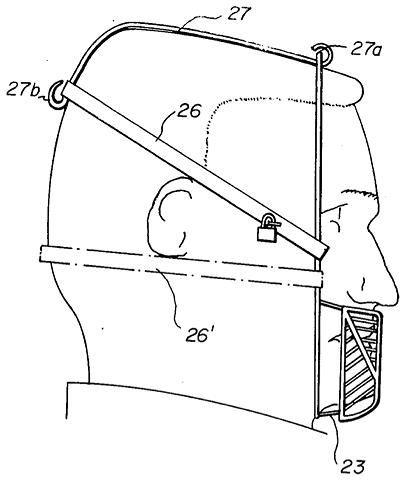
Patent No. 4,344,424, granted to Lucy L. Barmby of Sacramento, California in 1982. From the patent description:
It goes into more detail about who the invention might benefit:
I'm imagining a husband preparing to go to work and strapping the anti-eating face mask on his wife before he leaves.
But couldn't the wearer just lift the mask off? Nope. It's locked on, though "under emergency conditions, the strap may be cut and the face mask of the invention removed."
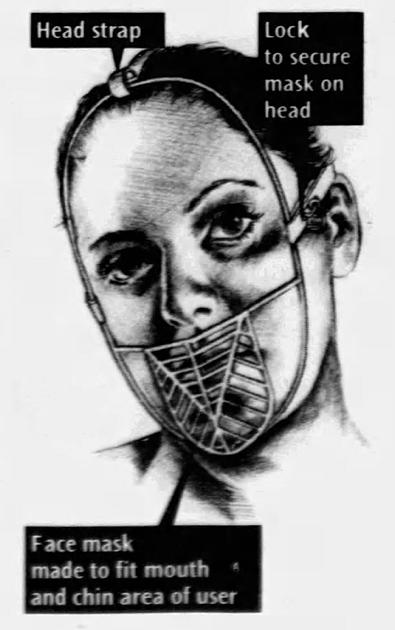
Edmonton Journal - Oct 8, 2006
The invention reminds me of the Scold's Bridle, aka 'muzzle for ladies,' that some women were forced to wear back in olden times.
Posted By: Alex - Wed Nov 20, 2019 -
Comments (5)
Category: Inventions, Patents, Dieting and Weight Loss
The Hollister Wind Bag
Patented by Thomas Lloyd Hollister in 1939. He called it a “gas receptor.” Basically, it was a fart collection bag. From the patent:

Posted By: Alex - Sat Mar 30, 2019 -
Comments (1)
Category: Inventions, Patents, Flatulence, 1930s
The Masculine Toilet
It's a toilet specially designed for men who suffer from being too well endowed. It's been in the news recently because the current acting Attorney General, Matthew Whitaker, once worked as the lawyer for the company that patented (or sought to patent) it. From the 2014 press release announcing the "Masculine Toilet":The Masculine Toilet reminds me of the Toilet Sanitary Shield For Men, which we posted about back in 2015. That was another device designed for men with oversized equipment.
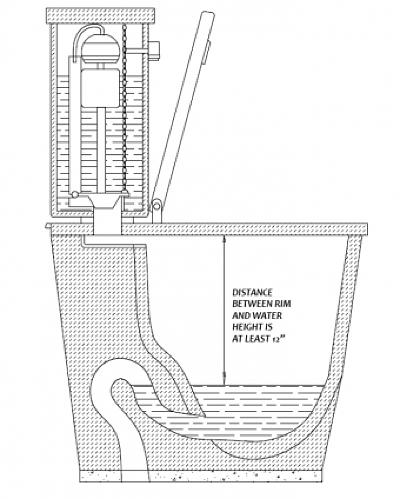
Posted By: Alex - Fri Nov 16, 2018 -
Comments (2)
Category: Bathrooms, Inventions, Patents
Invention Merit Badge
The Invention Merit Badge has the distinction of being the least-earned boy scout merit badge ever. Only 10 people ever earned it. The primary reason for this being that it required a scout to "invent and patent some useful article," which was a pretty high bar to set. After only three years the scout organization decided it was too much of a challenge and discontinued the badge. So it was only offered from 1911 to 1914. It was eventually replaced in 2010 by an Inventing badge which didn't have the patent requirement.Enthusiasts of scout history have tried to figure out who the 10 winners of the badge were and what they invented, but so far it seems that only one of the patents has been identified. It was a "uniform coat with a removable false sleeve on which Scouts could sew merit badges and rank badges," patented by Graeme Thomas Smallwood of Washington, D.C.
More info: Scouting Magazine, "History of the Invention Merit Badge" [pdf]
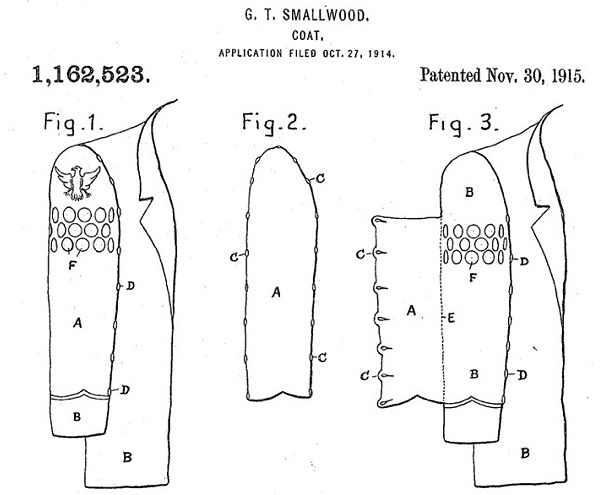
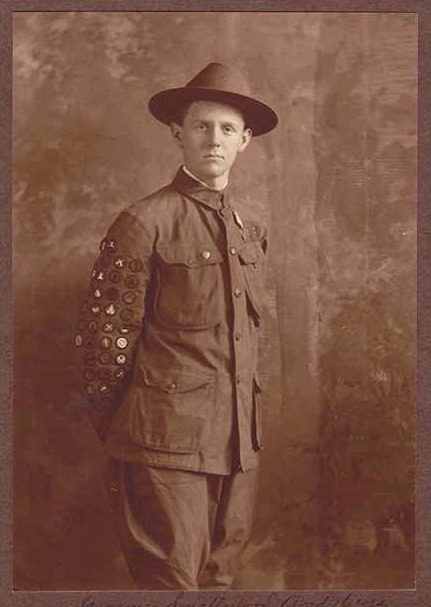
Graeme Smallwood
Posted By: Alex - Fri Oct 05, 2018 -
Comments (0)
Category: Clubs, Fraternities and Other Self-selecting Organizations, Inventions, Patents, 1910s
Whisper Seat
Patent awarded to Paul Bungo of Ambridge, Pennsylvania - July 20, 1971:Another object is to provide a whisper seat which accordingly will eliminate the embarrassment to an occupant of a bath room that persons outside thereof have heard him during a bowel movement.
I can't imagine that this invention actually worked, because how would it stop the sound from coming out from between your legs?

Posted By: Alex - Tue Oct 02, 2018 -
Comments (3)
Category: Inventions, Patents, Flatulence, 1970s
Toe Holder for Sunbathers
Invented by Russell Greathouse of Cuyahoga Falls, Ohio. Patented on Jan 23, 1973.When a sunbather lies on his back his feet are not normally held perpendicular to the ground, but swing outward. As a result, the inner surfaces of the legs are subjected more intensely to the sun’s rays than the outer surfaces. By the use of a toe holder or similar device which holds the big toes adjacent one another a relatively uniform burning effect is obtainable.
The toe holder shown in FIGS. 1, 2 and 3 includes two rings 5 and 6 joined by the web 7. There is a small hole 8 through the web. This hole is not necessary but provides means for decorating the toe holder, and in the drawing the stem 10 of a flower (natural or artificial) is held in the opening 8.

Posted By: Alex - Wed Sep 12, 2018 -
Comments (2)
Category: Inventions, Patents, 1970s

| Who We Are |
|---|
| Alex Boese Alex is the creator and curator of the Museum of Hoaxes. He's also the author of various weird, non-fiction, science-themed books such as Elephants on Acid and Psychedelic Apes. Paul Di Filippo Paul has been paid to put weird ideas into fictional form for over thirty years, in his career as a noted science fiction writer. He has recently begun blogging on many curious topics with three fellow writers at The Inferior 4+1. Contact Us |




